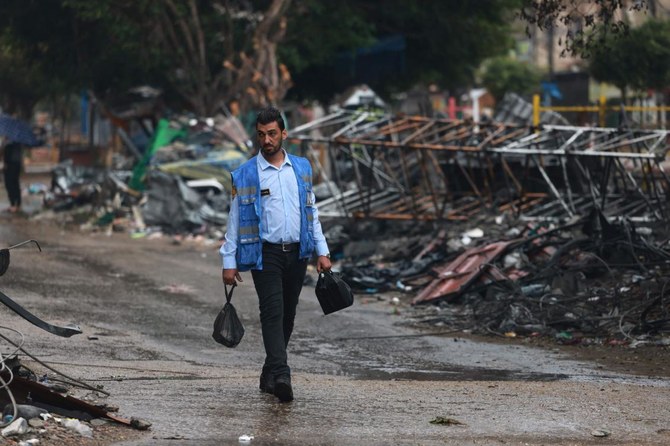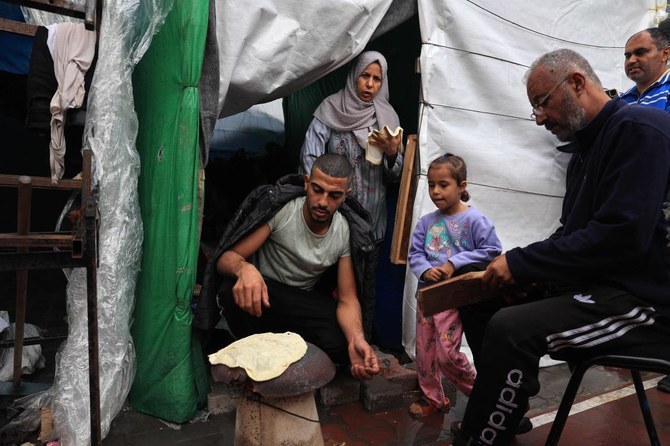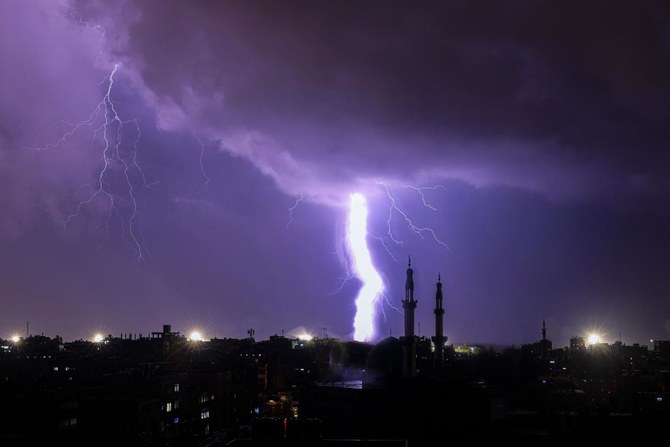RAFAH, Palestinian Territories: When Khulud Jarboueh and her children fled their home in the northern Gaza Strip under Israeli bombardment in early October, the young ones were wearing just shorts and T-shirts.
The heat of late summer still lingered then. But now she rummages through piles of clothing looking for something to keep them warm in the rain and bitter cold.
“We left Gaza City with 20 members of the family more than a month ago,” the 29-year-old told AFP at a second-hand clothes stall outside a school in Rafah run by the UN agency for Palestinian refugees (UNRWA).
They had left the north of the Palestinian territory after Israel warned people to flee south, saying it was safer there.
The exodus came after Israel’s military began a relentless bombardment of Gaza after Hamas militants stormed across the border on October 7 and killed around 1,200 people, mostly civilians.
They also seized around 240 hostages in attacks that sparked massive retaliation from Israel. The Hamas government in Gaza says Israeli attacks have killed around 11,500 people, including thousands of children.
Now Jarboueh and her family sleep on the floor of the UNRWA school.
“We didn’t take any clothes with us. But now it’s cold and I have to buy winter stuff,” she said at the stall where items of clothing go for a shekel each (around $0.25).
Even before the war, life in the Gaza Strip was difficult.
The United Nations estimates that in 2022, the blockade Israel had enforced against the territory since 2007 had “hollowed out Gaza’s economy.”
“The restrictions on movement also impede access to health and other essential services, as 80 percent of Gazans depend on international aid,” said UNCTAD, the UN Conference on Trade and Development.
Unemployment in the densely populated strip of land squeezed between Israel, Egypt and the Mediterranean Sea was 45 percent.
Today, the UN says, all 2.4 million people in Gaza are going hungry, and 1.65 million have been displaced by the war. With almost half the houses in Gaza destroyed or damaged, poverty will only get worse.
“It’s the first time in my life I’ve had to buy second-hand clothes,” said Jarboueh. “We’re not rich, but I can usually afford to pay 10 shekels for an item of clothing for the children.
“Now they’re coughing because it’s so cold. I have no other choice.”
She said she was sure the old clothes were “full of germs.”
“But they’re going to have to put them straight on. I don’t have the water to shower my children, let alone do the laundry.”
On a road lined with stalls, hundreds of Palestinians held up items to check sizes or compare fabrics. The temperature has now dropped and downpours are common.
Farmer Walid Sbeh said he has been uprooted from his land, and does not have a shekel to his name. He camps at the UNRWA school each night with his wife and 13 children.
“I can’t stand it, seeing my children still in their summer clothes go hungry, and I know I can’t buy them anything,” he told AFP.
“This is no life. They force us from our homes and kill us in cold blood. If we don’t die in the bombing we die of hunger or thirst, sickness and cold,” he said.
Sbeh said that when they left after their house was bombed they brought blankets with them.
“But on the road, the Israeli soldiers told us to drop everything and keep our hands up.”
He said some people gave them warmer clothing their own children had outgrown.
Adel Harzallah, who runs a clothes shop, said his stock of winter pyjamas sold out in two days.
“The war began when we were waiting for winter wear to arrive. It was due to come across the border” but that shut after the October 7 attacks in Israel.
Now his goods were stuck in containers, like food, drinking water and fuel, all only to be released for a high price.
One potential customer left Harzallah’s store disappointed.
“Seventy shekels for a jacket? I can’t pay that — I’ve got five kids,” she said.
Abdelnasser Abu Dia, 27, told AFP he “doesn’t have enough to buy bread, let alone clothes.”
For a month he had only the clothes in which he fled.
But as the temperature dropped, “someone gave me and my kids sportswear jackets. We’ve been wearing them non-stop for a week.”
Displaced Gazans search for warm clothes as cold draws in
https://arab.news/jjxp7
Displaced Gazans search for warm clothes as cold draws in

- The exodus came after Israel’s military began a relentless bombardment of Gaza
- Even before the war, life in the Gaza Strip was difficult
‘Shaking with cold’: tourists from Egypt boat sinking brought ashore

- Egypt released video footage Wednesday of the latest tourists rescued from a boat that capsized off the country’s Red Sea coast, where at least four people lost their lives
CAIRO: Egypt released video footage Wednesday of the latest tourists rescued from a boat that capsized off the country’s Red Sea coast, where at least four people lost their lives.
Seven people remain missing more than two days after the “Sea Story” was struck by a wave and overturned in the middle of the night.
The vessel had set off Sunday from Port Ghalib, near Marsa Alam in the southeast, on a multi-day diving trip with 31 tourists — mostly Europeans, along with Chinese and US nationals — and a 13-member crew.
Thirty-three were rescued, including tourists seen in the video stepping off a speedboat, draped in blankets, at a marina near Marsa Alam.
“We were shaking with cold,” one unidentified man said in the footage.
The tourists who appeared in the video had spent at least 24 hours inside a cabin of the overturned vessel before rescuers found them Tuesday morning, according to a government source close to the rescue operations.
Egyptian authorities rescue 28 people after a tourist boat on a diving trip sank off the Red Sea coast; the search continues for the 17 remaining passengers and crew https://t.co/ePmCnFBAf1 pic.twitter.com/kdATWhQv1S
— Reuters (@Reuters) November 25, 2024
A military-led team on Tuesday rescued two Belgians, one Swiss national, one Finnish tourist and one Egyptian, authorities said.
Two survivors — one identified by authorities on camera as an Egyptian — were rolled out on stretchers, one of them conscious and speaking.
A Belgian tourist sobbed when she was greeted by an Egyptian general.
Red Sea governor Amr Hanafi said the boat capsized “suddenly and quickly within five-seven minutes” after being struck by a strong wave in the middle of the night, leaving some passengers unable to escape their cabins.
The Sea Story had been due to dock on Friday at the tourist resort of Hurghada, about 200 kilometers (124 miles) north of Marsa Alam.
Authorities in Egypt have said the vessel was fully licensed and had passed all inspection checks. A preliminary investigation showed no technical fault.
There were at least two similar boat accidents in the Marsa Alam area earlier this year. There were no fatalities.
The Red Sea coast is a major tourist destination in Egypt.
Dozens of dive boats crisscross between Red Sea coral reefs and islands off Egypt’s eastern coast every day, where safety regulations are robust but unevenly enforced.
World reacts to Lebanon war ceasefire

PARIS: World leaders have welcomed a ceasefire deal between Israel and Lebanese militant group Hezbollah, which came into force on Wednesday morning (0200 GMT).
The ceasefire between Israel and Lebanon will protect Israel from the threat of Iran-backed militant group Hezbollah and create the conditions for a “lasting calm,” US President Joe Biden and French President Emmanuel Macron said ahead of the truce coming into force.
“The announcement today will cease the fighting in Lebanon, and secure Israel from the threat of Hezbollah and other terrorist organizations operating from Lebanon,” the leaders said in a joint statement.
The United States and France will work “to ensure this arrangement is fully implemented” and lead international efforts for “capacity-building” of the Lebanese army, they added.
Biden welcomed the deal as “good news” and also said the US would lead a fresh effort to secure a truce between Israel and Palestinian militant group Hamas in Gaza.
Macron said the Lebanon ceasefire should “open the path” for an ending to the war in Gaza.
Israeli Prime Minister Benjamin Netanyahu thanked the US president for his “involvement in securing the ceasefire agreement.”
He told Biden in a call that he appreciated the US leader’s “understanding that Israel will maintain its freedom of action in enforcing it,” according to Netanyahu’s office.
Ahead of Israel’s approval of the deal, Netanyahu said the “length of the ceasefire depends on what happens in Lebanon” and the truce would allow Israel to “intensify” pressure on Hamas and focus on the “Iranian threat.”
Lebanese Prime Minister Najib Mikati said the ceasefire was a “fundamental step” toward restoring stability in the region.
Thanking France and the US for their involvement, Mikati also reiterated his government’s commitment to “strengthen the army’s presence in the south.”
Iran, a backer of both Hezbollah and Hamas, welcomed the end of Israel’s “aggression” in Lebanon, after the ceasefire came into force.
“Welcoming the news” of the end of Israel’s “aggression against Lebanon,” foreign ministry spokesman Esmaeil Baghaei said, stressing Iran’s “firm support for the Lebanese government, nation and resistance.”
Hamas official Sami Abu Zuhri said the group “appreciates” Lebanon’s right to reach an agreement that protects its people, and it hopes for a deal to end the war in Gaza.
“Hamas appreciates the right of Lebanon and Hezbollah to reach an agreement that protects the people of Lebanon and we hope that this agreement will pave the way to reaching an agreement that ends the war of genocide against our people in Gaza,” Abu Zuhri told Reuters.
China said it was “paying close attention to the current situation in Lebanon and Israel.”
“We support all efforts conducive to easing tensions and achieving peace and welcome the agreement reached by relevant parties on a ceasefire,” foreign ministry spokeswoman Mao Ning said.
German Foreign Minister Annalena Baerbock welcomed the deal, hailing it as “a ray of hope for the entire region.”
“People on both sides of the border want to live in genuine and lasting security,” Baerbock said, calling the deal “a success for diplomacy.”
British Prime Minister Keir Starmer praised a “long overdue” ceasefire that would “provide some measure of relief to the civilian populations” of both Israel and Lebanon.
Calling for the truce to be “turned into a lasting political solution in Lebanon,” Starmer vowed to be at the “forefront of efforts to break the ongoing cycle of violence in pursuit of a long-term, sustainable peace in the Middle East.”
EU chief Ursula von der Leyen hailed the “very encouraging news” of the ceasefire, saying it would increase Lebanon’s “internal security and stability.”
The announcement was welcome news “first and foremost for the Lebanese and Israeli people affected by the fighting,” Von der Leyen said.
“Lebanon will have an opportunity to increase internal security and stability thanks to Hezbollah’s reduced influence,” she said.
A top UN official welcomed the ceasefire agreement, but warned that “considerable work lies ahead” to implement the deal.
“Nothing less than the full and unwavering commitment of both parties is required,” said UN special coordinator for Lebanon, Jeanine Hennis-Plasschaert.
Jordan said the ceasefire deal between Israel and Hezbollah should prompt greater international efforts to bring an end to the war in Gaza.
In an official statement, the kingdom said the move was also a first step towards reversing a dangerous escalation of tensions across the region that had threatened peace and security.
Iraq welcomed the ceasefire between Israel and Hezbollah in Lebanon, calling on the international community to act urgently to end Israel’s war with Hamas in Gaza.
A foreign ministry statement called for “multiplying international efforts to avoid any new escalation” along the Israel-Lebanon border, while also urging “serious, urgent steps to stop the continued massacres and violations against the Palestinian people in the Gaza Strip.”
Turkey said that it was ready to give Lebanon the “necessary support for the establishment of internal peace” hours after a ceasefire with Israel came into force.
The Palestinian Authority welcomed the 60-day ceasefire in Lebanon and expressed hope it would bring stability to the region.
“We hope that this step will contribute to stopping the violence and instability that the region is suffering from,” the Palestinian presidency said in a statement, and highlighted the need to enforce a UN resolution for a ceasefire in the Gaza Strip.
Israeli strikes on Gaza Strip leave 15 dead, medics say

CAIRO: Israeli military strikes across the Gaza Strip killed 15 people on Wednesday, some of them in a school housing displaced people, medics in Gaza said, adding that the fatalities included two sons of a former Hamas spokesman.
Health officials in the Hamas-run enclave said eight Palestinians were killed and dozens of others wounded in an Israeli strike that hit the Al-Tabeaeen School, which was sheltering displaced families in Gaza City. Among those killed were two sons of former Hamas spokesman, Fawzi Barhoum, according to medics and Barhoum himself.
In the Shejaia suburb of Gaza City, another strike killed four people, while three people were killed in an Israeli air strike in Beit Lahiya on the northern edge of the enclave where army forces have been operating since last month.
Separately, a ceasefire between Israel and Iran-backed group Hezbollah came into effect on Wednesday after both sides accepted an agreement brokered by the US and France, a rare victory for diplomacy in a region shaken by two wars for over a year.
Iran-backed Hezbollah militants began firing missiles at Israel in solidarity with Hamas after the Palestinian militant group attacked Israel in October of 2023, killing around 1,200 people and capturing over 250 hostages, Israel has said, triggering the Gaza war.
Israel’s 13-month campaign in Gaza has left nearly 44,200 people dead and displaced nearly all the enclave’s population at least once, according to Gaza health officials.
Months of attempts to negotiate a ceasefire have yielded scant progress and negotiations are now on hold, with mediator Qatar saying it has told the two warring parties it would suspend its efforts until the sides are prepared to make concessions.
US President Joe Biden said on Tuesday his administration was pushing for a ceasefire in Gaza and that it was possible that Saudi Arabia and Israel could normalize relations.
Israeli military says it fired to stop suspects reaching Lebanon no-go zone

DUBAI: Israeli forces on Wednesday fired at several vehicles with suspects to prevent them from reaching a no-go zone in Lebanese territory and the suspects moved away, the Israeli military said in a statement, hours after a ceasefire between Israel and Lebanese militant group Hezbollah came into effect at 0200 GMT.
Hezbollah says launched drones ahead of ceasefire at ‘sensitive military targets’ in Tel Aviv

BEIRUT, Lebanon: Lebanon’s Hezbollah said it launched drones at “sensitive military targets” in Tel Aviv on Tuesday evening, after deadly Israeli strikes in Beirut and as news of a ceasefire deal was announced.
“In response to the targeting of the capital Beirut and the massacres committed by the Israeli enemy against civilians,” Hezbollah launched “drones at a group of sensitive military targets in the city of Tel Aviv and its suburbs,” the group said in a statement.






















